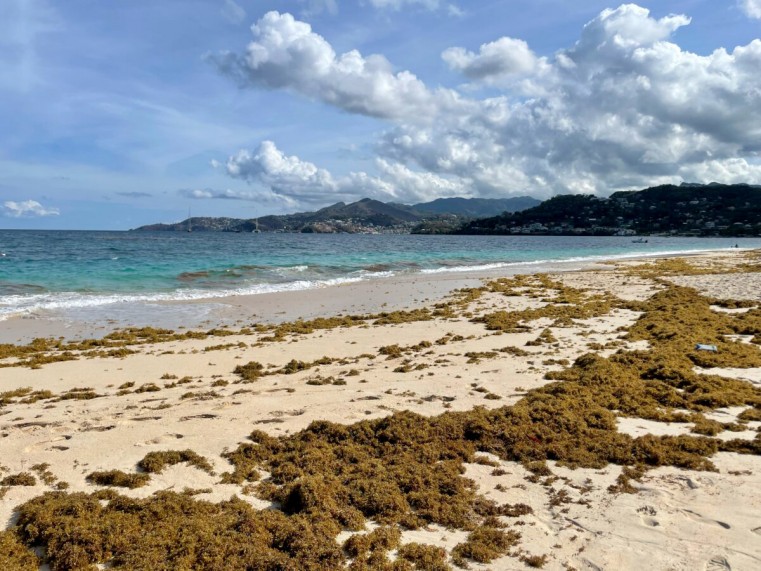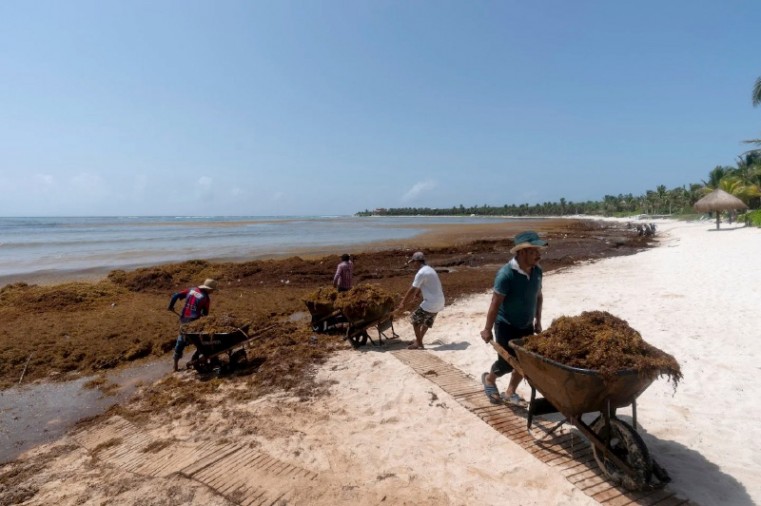Grenada is finding solutions to its sargassum invasion
- Job Market
- Upload Ad Requests
- Rates
- Home
- Video
- About Us
- Contact Us
- Business Showcase
- Archives
- Blogs
- Upload Advertisements
- Video News Release
- Front Pages
- Community Notices
- Law Enforcement
- Government
- Community Voice
- Health Care
- International
- Sports
- Politics
- Community
- Entertainment
- Advertorial 2
- Non-Profit Organisation(NPO)
- Adopt a Pet
- Tourism
- CIIPO
- Taste of Class
- Opinions & Editorial
- Environment
- Outstanding Employee
- Outstanding Performance
- Celebration
- Gardening
- Beneficial Ownership
- Tips and tricks
- Cover Stories
- Cost of Living
- Development
- Employment
- Education
- Arts and Culture
- Business
- Global News Briefs
- Hurricane Watch
- Breaking News
- Regional
- Public Notices
- Local News
- Lifestyle
- Finance
- Economic
- Election Center
- COVID - 19
- UK Territories
- Advertorial
- History
- Inspiration
- The Panel
- The Interview
- Cayman Conversation
- Community Notices
- Law Enforcement
- Government
- Health Care
- Sports
- Election Center
- Cayman Conversation
- More
- Front Pages
- Community Notices
- Law Enforcement
- Government
- Community Voice
- Health Care
- International
- Sports
- Politics
- Community
- Entertainment
- Advertorial 2
- Non-Profit Organisation(NPO)
- Adopt a Pet
- Tourism
- CIIPO
- Taste of Class
- Opinions & Editorial
- Environment
- Outstanding Employee
- Outstanding Performance
- Celebration
- Gardening
- Beneficial Ownership
- Tips and tricks
- Cover Stories
- Cost of Living
- Development
- Employment
- Education
- Arts and Culture
- Business
- Global News Briefs
- Hurricane Watch
- Breaking News
- Regional
- Public Notices
- Local News
- Lifestyle
- Finance
- Economic
- Election Center
- COVID - 19
- UK Territories
- Advertorial
- History
- Inspiration
- The Panel
- The Interview
- Cayman Conversation
Subscribe
Grenada tackles stinky weed
Grenada is finding solutions to its sargassum invasion

Sargassum is wheeled away and used for many purposes
Sargassum is wheeled away and used for many purposes

Grenada is leading the way in the battle to tackle the seasonal problem of sargassum on Caribbean beaches. At this time of year, the build-up of the noxious smelling seaweed creates a huge expense and setback for governments and tourist boards.
The Grenada government is working to overcome sargassum invasion with the European Union and is looking for companies to partner them in creating a multibillion-dollar market for the Caribbean.
The sargassum issue has blighted the island for more than a decade, but now UK-based aquaculture business Seafields has created a water-based farm to catch the sargassum before it reaches land, preventing it from rotting and releasing methane.
Seafields aims to rebrand the seaweed as a revolutionary solution to the climate crisis that could power homes and businesses with clean energy and boost agricultural yields. It has also developed ways to harness it for agriculture and renewable energy.
Sargassum is one of the greatest environmental challenges facing the region’s coasts in recent years. The presence of this stinking algae has disrupted numerous marine ecosystems and economies. The Cayman Islands has been affected as much as other countries in the region.
The arrival of sargassum impacts beaches and ecosystems when, once they reach the shore, they dry out and decompose. This ends up releasing toxic gases and unpleasant odours, even affecting corals and seagrass beds. It often forms a thick layer on beaches, hampering access and impacting the local tourism-based economy.
Rather than see it as an expensive problem, Grenada is transforming it into an opportunity for sustainability and resource extraction through science, technological innovation and community engagement.
Sargassum has always been essential to marine ecosystems, providing habitat and food for a multitude of species. However, since 2009, the volume of evasive seaweed has increased exponentially causing a huge headache for countries in multiple ways. Scientists believe its excessive build up – not just in the Caribbean but in other regions too - has come through climate change and ocean pollution.
Many residents of Soubise in Grenada, one of the areas worst affected, say they have learned to live with the problem. Concerns have arisen about the effects of methane and other gases emitted by the weed, which they say cause skin rashes, discolour jewellery and damage household appliances and boats. “We have had to deal with this problem for quite some years now,” says Emmalin Pierre, a local MP and leader of the opposition New National party. “It has been a major problem for not just the fishermen in the area but also residents.”
Online Poll
Independent or Party: Independents top the Category with 23 Candidates. Select your preference
Popular News
DIRE CONSEQUENCES OF OVER- DEVELOPMENT
14 Apr, 2025
Max Romeo’s legacy stretched for decades
14 Apr, 2025
NUMBERS COUNT IN THE GEORGE TOWN EAST FORUM
09 Apr, 2025
Mexico beat Cayman 20-10 in ‘Big Match X’ Rugby
05 Jun, 2024















Comments (0)
We appreciate your feedback. You can comment here with your pseudonym or real name. You can leave a comment with or without entering an email address. All comments will be reviewed before they are published.